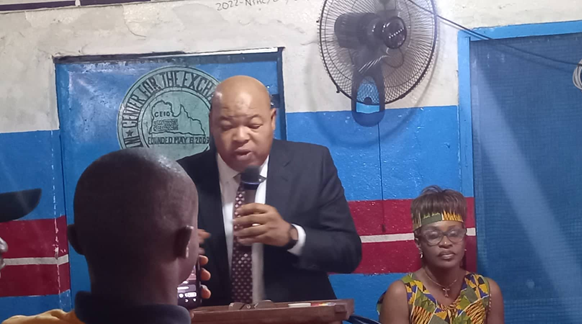By Bill W. Cooper
Presidential hopeful Allen Brown promises a relentless fight against corruption with his administration’s zero-tolerance policy.
Contesting on the Liberia Restoration Party (LRP) ticket, he is dedicated to ushering in a new era of transparency and accountability, as his campaign has gained significant momentum, resonating with an electorate longing for an end to systemic corruption that has plagued the nation.
Brown, experienced and respected in Liberia, has made it his paramount mission to eradicate corruption from the roots, instilling confidence among citizens and foreign investors alike.
With a vision of a prosperous and corruption-free Liberia, the LRP standard bearer also outlined a comprehensive strategy that aims to tackle corruption in all its forms.
At the core of Brown’s campaign is a commitment to implement stringent laws and regulations that will ensure ethical conduct in both public and private sectors.
Speaking to scores of citizens over the weekend, at the Center for the Exchange of Intellectual Opinion (CIEO), Aspirant Brown further warned that those who engage in corrupt practices will face the full force of the law, leaving no room for impunity.
He maintained that a Brown-Noosevett administration intends to bolster the existing legal framework, strengthening anti-corruption institutions and providing them with the resources necessary for effective operation.
Recognizing that transparency is key to combatting corruption, Brown promises a robust system of checks and balances, prioritizing the establishment of an independent anti-corruption commission, tasked with investigating and prosecuting corrupt individuals, irrespective of their social or political status.
“This commission will work in tandem with other law enforcement agencies to create a cohesive front against corruption, ensuring that no wrongdoing goes unnoticed or unpunished,” he noted.
He also stated that his administration plans to adopt a proactive approach by promoting a culture of accountability and integrity, amongst other things.
Through the implementation of state-of-the-art technology, he aims to enhance transparency in government transactions, minimizing opportunities for corruption, and believes that leveraging technology can streamline bureaucratic processes, reducing the potential for corrupt practices and eliminating the temptation for illicit gains.
As part of his comprehensive strategy, he also plans to introduce anti-corruption education programs in schools and universities, encouraging a new generation of responsible citizens who will play a crucial role in shaping an ethical and transparent society.

